Haile Selassie
Appearance
(Redirected from Haile Selassie I of Ethiopia)
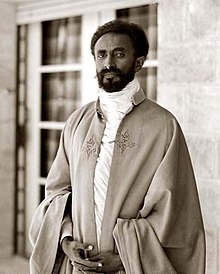
Haile Selassie [Ge'ez: ቀዳማዊ ኃይለ ሥላሴ, romanized: qädamawi haylä səllasé] (23 July 1892 – 27 August 1975), born Tafari Makonnen Woldemikael, was regent of Ethiopia from 1916 to 1930 and Emperor of Ethiopia from 1930 to 1974, including 5 years of exile from 1936 to 1941 in the period of Italian occupation. Though himself a life-long Christian, and a member of the Ethiopian Orthodox Tewahedo Church, an Oriental Orthodox Church, he became revered as God incarnate by followers of the Rastafari movement founded in Jamaica in the early 1930s. He was overthrown by a Communist coup d'état in 1974.
Quotes
[edit]

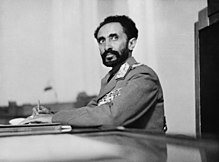






- In time of war it suits the enemy to aim his guns at adorned shields, ornaments, silver and gold cloaks, silk shirts and all similar things. Whether one possesses a jacket or not, it is best to wear a narrow-sleeved shirt with faded colours. When we return, with God's help, you can wear your gold and silver decorations then. Now it is time to go and fight. We offer you all these words of advice in the hope that no great harm should befall you through lack of caution. At the same time, We are glad to assure you that in time of war We are ready to shed Our blood in your midst for the sake of Ethiopia's freedom...
- Instructions to military units (19 October 1935), later published in The Autobiography of Emperor Haile Sellassie (1976), Ch. 35
- We have decided to bring to an end the most unequal, most unjust, most barbarous war of our age, and have chosen the road to exile in order that our people will not be exterminated and in order to consecrate ourselves wholly and in peace to the preservation of our empire's independence … we now demand that the League of Nations should continue its efforts to secure respect for the covenant, and that it should decide not to recognize territorial extensions, or the exercise of an assumed sovereignty, resulting from the illegal recourse to armed force and to numerous other violations of international agreements.
- Telegram to the League of Nations on the Second Italo-Abyssinian War (10 May 1936), as quoted in Days of Emperor and Clown : The Italo-Ethiopian War, 1935-1936 (1973) by James Dugan and Laurence Davis Lafore, p. 204
- It is us today. It will be you tomorrow.
- Statement after his speech before the League of Nations (30 June 1936), as quoted in ""The Lion is Freed" in Time magazine (8 September 1975)
- Today is the day on which we defeated our enemy. Therefore, when we say let us rejoice with our hearts, let not our rejoicing be in any other way but in the spirit of Christ. Do not return evil for evil. Do not indulge in the atrocities which the enemy has been practicing in his usual way, even to the last.
Take care not to spoil the good name of Ethiopia by acts which are worthy of the enemy. We shall see that our enemies are disarmed and sent out the same way they came. As Saint George who killed the dragon is the Patron Saint of our army as well as of our allies, let us unite with our allies in everlasting friendship and amity in order to be able to stand against the godless and cruel dragon which has newly risen and which is oppressing mankind.- Address in Addis Ababa (5 May 1941), as translated in My Life and Ethiopia's Progress, Vol. 2, (1999), p. 165
- We have finished the job. What shall we do with the tools?
- Telegram to Winston Churchill after reclaiming Ethiopia from Italian forces (1941), as quoted in Ambrosia and Small Beer (1964) by Edward Marsh. This makes a play on Churchill's 1941 statement to the U.S. "Give us the tools, and we will finish the job".
- May it be taken as Divine significance, that, as We mark the passing of the Nazi Reich, in America at San Francisco, delegates from all United Nations, among whose number Ethiopia stands, are now met together for their long-planned conference to lay foundations for an international pact to banish war and to maintain World Peace. Our Churches pray for the successful triumph of this conference. Without success in this, the Victory, We celebrate today, the suffering that We have all endured will be of no avail.
To win the War, to overcome the enemy upon the fields cannot alone ensure the Victory in Peace. The cause of War must be removed. Each Nation's rights must be secure from violation. Above all, from the human mind must be erased all thoughts of War as a solution. Then and then only will War cease.
- One cannot deny that in former times man's life had been one of toil and hardship. It is correct to say, therefore, that modern civilization and the progress of science have greatly improved man's life and have brought comfort and ease in their trail. But civilization can serve man both for good as well as for evil purposes. Experience shows that it has invariably brought great dividends to those who use it for good purposes while it has always brought incalculable harm and damnation to those who use it for evil purposes. To make our wills obedient to good influences and to avoid evil, therefore, is to show the greatest wisdom. In order to follow this aim one must be guided by religion. Progress without religion is just like a life surrounded by unknown perils and can be compared to a body without a soul. All human inventions, from the most primitive tool to the modern atom, can help man greatly in his peaceful endeavours. But if they are put to evil purposes they have the capacity to wipe out the human race from the surface of the earth. It is only when the human mind is guided by religion and morality that man can acquire the necessary vision to put all his ingenuous inventions and contrivances to really useful and beneficial purposes.
- The progress of science can be said to be harmful to religion only in so far as it is used for evil aims and not because it claims a priority over religion in its revelation to man. It is important that spiritual advancement must keep pace with material advancement. When this comes to be realized man's journey toward higher and more lasting values will show more marked progress while the evil in him recedes into the background. Knowing that material and spiritual progress are essential to man, we must ceaselessly work for the equal attainment of both. Only then shall we be able to acquire that absolute inner calm so necessary to our well-being.
It is only when a people strike an even balance between scientific progress and spiritual and moral advancement that it can be said to possess a wholly perfect and complete personality and not a lopsided one.- Interview in The Voice of Ethiopia (5 April 1948)
- When we consider the time which is necessary to fulfill the needs of an individual it will easily be understood that the needs of a vast country like Ethiopia can only be filled progressively and by stages.
For the life of the world is such that periods of constructive achievement are followed by periods of destruction: the period of construction brings peace and the period of destruction brings uncertainty. We have always kept in mind that the union of the spiritual strength of the people with the material power of the independent nation provides the firm basis for our people to overcome the hardships and difficulties of life facing them in this world.
- Imagination, devotion, perseverance, together with divine grace, will assure your success.
- Address on the 18th anniversary of his coronation (2 November 1948)
- Spiritual power is the eternal guide, in this life and the life after, for man ranks supreme among all creatures. Led forward by spiritual power, man can reach the summit destined for him by the Great Creator.
- On the Nomination of Archbishop Basilios (19 January 1951)
- Leadership does not mean domination. The world is always well supplied with people who wish to rule and dominate others.
The true leader is a different sort; he seeks effective activity which has a truly beneficient purpose. He inspires others to follow in his wake, and holding aloft the torch of wisdom, leads the way for society to realize its genuinely great aspirations.- Speech on Leadership in Speeches Delivered on Various Occasions, May 1957-December 1959 (1960), p. 138
- The art of leadership is in the ability to make people want to work for you, while they are really under no obligation to do so. Leaders are people, who raise the standards by which they judge themselves and by which they are willing to be judged. The goal chosen, the objective selected, the requirements imposed, are not mainly for their followers alone.
They develop with consumate energy and devotion, their own skill and knowledge in order to reach the standard they themselves have set.
This whole-hearted acceptance of the demands imposed by even higher standards is the basis of all human progress. A love of higher quality, we must remember, is essential in a leader.- Speech on Leadership in Speeches Delivered on Various Occasions, May 1957-December 1959 (1960), p. 138
- Education is a means of sharpening the mind of man both spiritually and intellectually. It is a two-edged sword that can be used either for the progress of mankind or for its destruction. That is why it has been Our constant desire and endeavor to develop our education for the benefit of mankind.
A qualified man with vision, unmoved by daily selfish interests, will be led to right decisions by his conscience. In general, a man who knows from whence he comes and where he is going will co-operate with his fellow human beings. He will not be satisfied with merely doing his ordinary duties but will inspire others by his good example. You are being watched by the nation and you should realize that you will satisfy it if you do good; but if, on the contrary, you do evil, it will lose its hope and its confidence in you.- University Graduation address (2 July 1963), published in Important Utterances of H. I. M. Emperor Haile Selassie I, 1963-1972 (1972), p. 22
- Throughout history, it has been the inaction of those who could have acted, the indifference of those who should have known better, the silence of the voice of justice when it mattered most, that has made it possible for evil to triumph.
- Cited as from an address in Addis Ababa (1963) in Simpson's Contemporary Quotations (1988) edited by James B. Simpson ISBN 0395430852
- In the history of the human race, those periods which later appeared as great have been the periods when the men and the women belonging to them had transcended the differences that divided them and had recognized in their membership in the human race a common bond.
- Address at Haile Selassie I University (now Addis Ababa University) honoring Indian President Sarvepalli Radhakrishnan (13 October 1965)
- This age above all ages is a period in history when it should be our prime duty to preach the Gospel of Grace to all our fellow men and women. The love shown in Christ by our God to mankind should constrain all of us who are followers and disciples of Christ to do all in our power to see to it that the Message of Salvation is carried to those of our fellows for whom Christ Our Saviour was sacrificed but who have not had the benefit of hearing the good news. Since nobody can interfere in the realm of God we should tolerate and live side by side with those of other faiths.
- Address to the World Evangelical Congress in Berlin (28 October 1966)
- We wish to recall here the spirit of tolerance shown by Our Lord Jesus Christ when He gave forgiveness to all including those that crucified Him.
- Address to the World Evangelical Congress in Berlin (28 October 1966)
- What we seek is a new and a different way of life. We search for a way of life in which all men will be treated as responsible human beings, able to participate fully in the political affairs of their government; a way of life in which ignorance and poverty, if not abolished, are at least the exception and are actively combatted; a way of life in which the blessings and benefits of the modern world can be enjoyed by all without the total sacrifice of all that was good and beneficial in the old Ethiopia. We are from and of the people, and our desires derive from and are theirs.
Can this be achieved from one dusk to the next dawn, by the waving of a magic wand, by slogans or by Imperial declaration? Can this be imposed on our people, or be achieved solely by legislation? We believe not. All that we can do is provide a means for the development of procedures which, if all goes well, will enable an increasing measure and degree of what we seek for our nation to be accomplished.
- Generations come and pass. The learned of our Church and the laity know what fundamental relations we now have, and had, with the Egyptian Church. It is religion that binds us with our brethren in Egypt. When We say religion, it is not restricted to the professed faith. In this connection no one should question the faith of others, for no human can judge the ways of God.
- "Investiture of New Patriarch" (11 May 1971), in Important Utterances of H. I. M. Emperor Haile Selassie I, 1963-1972 (1972) edited by the Imperial Ethiopian Ministry of Information, p. 268
- It is obvious that We have been young. We weren't born old! We have been a child, a boy, a youth, an adult, and finally an old man. Like everyone else. Our Lord the Creator made us like everyone else. Maybe you wish to know what kind of youth We were. Well We were a very serious, very diligent, very obedient youth. We were sometimes punished, but do you know why? Because what We were made to study did not seem enough and We wished to study further. We wanted to stay on at school after lessons were over. We were loath to amuse ourselves, to go riding, to play. We didn't want to waste time on games.
- Interview with Oriana Fallaci as reported in The Chicago Tribune (24 June 1973) (Excerpts online)
- Democracy, republics: What do these words signify? What have they changed in the world? Have men become better, more loyal, kinder? Are the people happier? All goes on as before, as always. Illusions, illusions. Besides, one should consider the interest of a nation before subverting it with words. Democracy is necessary in some cases and We believe some African peoples might adopt it. But in other cases it is harmful, a mistake.
- Interview with Oriana Fallaci in The Chicago Tribune (24 June 1973)
- I have heard of that idea [i.e., of Haile Selassie being the reincarnation of Jesus Christ]. I also met certain Rastafarians. I told them clearly that I am a man, that I am mortal, and that I would be replaced by the oncoming generation, and that they should never make a mistake in assuming or pretending that the human being is emanated from a deity.
- Interview with Bill McNeil, as quoted in Transform Your World Through the Powers of Your Mind (2009) by Jawara D. King, p. 295
Address to the League of Nations (1936)
[edit]
- Addressing the League of Nations on the Abyssinia Crisis and Second Italo-Abyssinian War in Geneva, Switzerland (30 June 1936)
- I, Haile Selassie I, Emperor of Ethiopia, am here today to claim that justice which is due to my people, and the assistance promised to it eight months ago, when fifty nations asserted that aggression had been committed in violation of international treaties.
There is no precedent for a Head of State himself speaking in this assembly. But there is also no precedent for a people being victim of such injustice and being at present threatened by abandonment to its aggressor.
- It is my duty to inform the Governments assembled in Geneva, responsible as they are for the lives of millions of men, women and children, of the deadly peril which threatens them, by describing to them the fate which has been suffered by Ethiopia. It is not only upon warriors that the Italian Government has made war. It has above all attacked populations far removed from hostilities, in order to terrorize and exterminate them.
- For 20 years past, either as Heir Apparent, Regent of the Empire, or as Emperor, I have never ceased to use all my efforts to bring my country the benefits of civilization, and in particular to establish relations of good neighbourliness with adjacent powers. In particular I succeeded in concluding with Italy the Treaty of Friendship of 1928, which absolutely prohibited the resort, under any pretext whatsoever, to force of arms, substituting for force and pressure the conciliation and arbitration on which civilized nations have based international order.
- I assert that the problem submitted to the Assembly today is a much wider one. It is not merely a question of the settlement of Italian aggression.
It is collective security: it is the very existence of the League of Nations. It is the confidence that each State is to place in international treaties. It is the value of promises made to small States that their integrity and their independence shall be respected and ensured.
- Apart from the Kingdom of the Lord there is not on this earth any nation that is superior to any other. Should it happen that a strong Government finds it may with impunity destroy a weak people, then the hour strikes for that weak people to appeal to the League of Nations to give its judgment in all freedom. God and history will remember your judgment.
- I have heard it asserted that the inadequate sanctions already applied have not achieved their object. At no time, and under no circumstances could sanctions that were intentionally inadequate, intentionally badly applied, stop an aggressor. This is not a case of the impossibility of stopping an aggressor but of the refusal to stop an aggressor.
- I ask the fifty-two nations, who have given the Ethiopian people a promise to help them in their resistance to the aggressor, what are they willing to do for Ethiopia? And the great Powers who have promised the guarantee of collective security to small States on whom weighs the threat that they may one day suffer the fate of Ethiopia, I ask what measures do you intend to take?
Representatives of the World I have come to Geneva to discharge in your midst the most painful of the duties of the head of a State. What reply shall I have to take back to my people?
The Autobiography of Emperor Haile Sellassie I (1937; 1976)
[edit]- Written while in exile in England in 1937, published as The Autobiography of Emperor Haile Sellassie I : "My Life and Ethiopia's Progress" 1892-1937, as translated by Edward Ullendorff (1976) ISBN 0197135897

- A house built on granite and strong foundations, not even the onslaught of pouring rain, gushing torrents and strong winds will be able to pull down. Some people have written the story of my life representing as truth what in fact derives from ignorance, error or envy; but they cannot shake the truth from its place, even if they attempt to make others believe it.
Address to the United Nations (1963)
[edit]
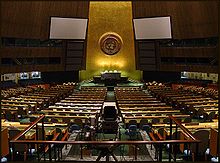
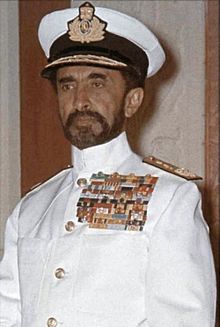
- Address to the UN General Assembly (4 October 1963)
- Twenty-seven years ago, as Emperor of Ethiopia, I mounted the rostrum in Geneva, Switzerland, to address the League of Nations and to appeal for relief from the destruction which had been unleashed against my defenceless nation, by the Fascist invader.
I spoke then both to and for the conscience of the world. My words went unheeded, but history testifies to the accuracy of the warning that I gave in 1936. Today, I stand before the world organization which has succeeded to the mantle discarded by its discredited predecessor. In this body is enshrined the principle of collective security which I unsuccessfully invoked at Geneva. Here, in this Assembly, reposes the best — perhaps the last — hope for the peaceful survival of mankind.
- The Charter of the United Nations expresses the noblest aspirations of man: abjugation of force in the settlement of disputes between states; the assurance of human rights and fundamental freedoms for all without distinction as to race, sex, language or religion; the safeguarding of international peace and security.
But these, too, as were the phrases of the Covenant, are only words; their value depends wholly on our will to observe and honour them and give them content and meaning. The preservation of peace and the guaranteeing of man's basic freedoms and rights require courage and eternal vigilance: courage to speak and act — and if necessary, to suffer and die — for truth and justice; eternal vigilance, that the least transgression of international morality shall not go undetected and unremedied.
These lessons must be learned anew by each succeeding generation, and that generation is fortunate indeed which learns from other than its own bitter experience. This Organization and each of its members bear a crushing and awesome responsibility: to absorb the wisdom of history and to apply it to the problems of the present, in order that future generations may be born, and live, and die, in peace.
- The United Nations continues to sense as the forum where nations whose interests clash may lay their cases before world opinion. It still provides the essential escape valve without which the slow build-up of pressures would have long since resulted in catastrophic explosion.
- How different in 1963 are the attitudes of men. We then existed in an atmosphere of suffocating pessimism. Today, cautious yet buoyant optimism is the prevailing spirit. But each one of us here knows that what has been accomplished is not enough. The United Nations judgments have been and continue to be subject to frustration, as individual member-states have ignored its pronouncements and disregarded its recommendations. The Organization's sinews have been weakened, as member states have shirked their obligations to it. The authority of the Organization has been mocked, as individual member-states have proceeded, in violation of its commands, to pursue their own aims and ends.
- There is no single magic formula, no one simple step, no words, whether written into the Organization's Charter or into a treaty between states, which can automatically guarantee to us what we seek. Peace is a day-to day problem, the product of a multitude of events and judgments. Peace is not an "is", it is a "becoming." We cannot escape the dreadful possibility of catastrophe by miscalculation. But we can reach the right decisions on the myriad subordinate problems which each new day poses, and we can thereby make our contribution and perhaps the most that can be reasonably expected of us in 1963 to the preservation of peace.
It is here that the United Nations has served us — not perfectly, but well.
- Disarmament has become the urgent imperative of our time. I do not say this because I equate the absence of arms to peace, or because I believe that bringing an end to the nuclear arms race automatically guarantees the peace, or because the elimination of nuclear warheads from the arsenals of the world will bring in its wake that change in attitude requisite to the peaceful settlement of disputes between nations. Disarmament is vital today, quite simply, because of the immense destructive capacity of which men dispose.
- Here is our opportunity and our challenge. If the nuclear powers are prepared to declare a truce, let us seize the moment to strengthen the institutions and procedures which will serve as the means for the pacific settlement of disputes among men.
- Conflicts between nations will continue to arise. The real issue is whether they are to be resolved by force, or by resort to peaceful methods and procedures, administered by impartial institutions. This very Organization itself is the greatest such institution, and it is in a more powerful United Nations that we seek, and it is here that we shall find, the assurance of a peaceful future.
- Were a real and effective disarmament achieved and the funds now spent in the arms race devoted to the amelioration of man's state; were we to concentrate only on the peaceful uses of nuclear knowledge, how vastly and in how short a time might we change the conditions of mankind. This should be our goal.
- When we talk of the equality of man, we find, also, a challenge and an opportunity; a challenge to breathe new life into the ideals enshrined in the Charter, an opportunity to bring men closer to freedom and true equality. and thus, closer to a love of peace.
The goal of the equality of man which we seek is the antithesis of the exploitation of one people by another with which the pages of history and in particular those written of the African and Asian continents, speak at such length.
Exploitation, thus viewed, has many faces. But whatever guise it assumes, this evil is to be shunned where it does not exist and crushed where it does.
- On the question of racial discrimination, the Addis Ababa Conference taught, to those who will learn, this further lesson:
That until the philosophy which holds one race superior and another inferior is finally and permanently discredited and abandoned:
That until there are no longer first-class and second class citizens of any nation;
That until the colour of a man's skin is of no more significance than the colour of his eyes;
That until the basic human rights are equally guaranteed to all without regard to race;
That until that day, the dream of lasting peace and world citizenship and the rule of international morality will remain but a fleeting illusion, to be pursued but never attained;
And until the ignoble and unhappy regimes that hold our brothers in Angola, in Mozambique and in South Africa in subhuman bondage have been toppled and destroyed;
Until bigotry and prejudice and malicious and inhuman self-interest have been replaced by understanding and tolerance and good-will;
Until all Africans stand and speak as free beings, equal in the eyes of all men, as they are in the eyes of Heaven;
Until that day, the African continent will not know peace.
Misattributed
[edit]
- In the mystic traditions of the different religions we have a remarkable unity of spirit. Whatever religion they may profess, they are spiritual kinsmen. While the different religions in their historic forms bind us to limited groups and militate against the development of loyalty to the world community, the mystics have already stood for the fellowship of humanity in harmony with the spirit of the mystics of ages gone by.
- Words of Sarvepalli Radhakrishnan, quoted by Haile Selassie in an address during the Indian President's state visit to Ethiopia (13 October 1965), quoted in Foreign Affairs Record Vol. 11-12 (1965-1966) by India Ministry of External Affairs, p. 266; Radhakrishnan is also quoted as having made these remarks in The Visva-Bharati Quarterly Vol. 5 (1939-1940)
- The temple of the most high begins with the human body, which houses our life, essence of our existence. Africans are in bondage today because they approach spirituality through Religion provided by foreign invaders and conquerors. We must stop confusing religion and spirituality. Religion is a set of rules, regulations and rituals created by humans which were supposed to help people grow spiritually.
Due to human imperfection religion has become corrupt, political, divisive and a tool for power struggle. Spirituality is not theology or ideology. It is simply a way of life, pure and original as was given by the Most High. Spirituality is a network linking us to the Most High, the universe and each other. As the essence of our existence it embodies our culture, true identity, nationhood and destiny. A people without a nation they can really call their own is a people without a soul. Africa is our nation and is in spiritual and physical bondage because her leaders are turning to outside forces for solutions to African problems when everything Africa needs is within her. When African righteous people come together, the world will come together. This is our divine destiny.- Words of Appollo P.K Nvenge aka Amentu P.K N'venge in the book African Unity: the Only Solution, missatributed to Haile Selassie by different sources.
Quotes about Haile Selassie I
[edit]

- Alphabetized by author
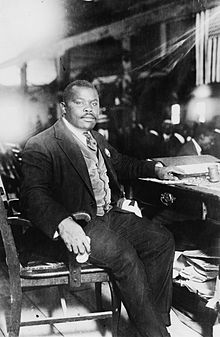
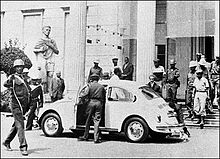

- The Emperor of Ethiopia has been deposed by a military coup … Poor Haile Selassie; over the past few years he'd lost control and the inevitable was bound to happen. I remember his attendance at the monarchy celebrations, how he snatched his hand away when I tried to help him from his car, telling me he could manage well enough on his own, thank you very much. Likewise during the recent drought when thousands of his people were dying he refused all HIM's offers of help, denying that anyone was suffering or even that there was a drought. He saw himself as a mighty ruler, but now the truth has caught up with him. At the Shavand Palace today I could think of nothing but Haile Selassie's fate. Inevitably one is inclined to draw parallels … They are not reassuring ...
- Asadollah Alam, in The Shah and I : The Confidential Diary of Iran's Royal Court, 1968-77 (1991), p. 388
- Haile Selassie had surely made many mistakes during his very long tenure, first and foremost his being in a constant limbo between reform and conservatism, without ever having made a definitive decision. But the revolution which toppled him in the name of freedom and progress has revealed itself to be a hundred times worse than his regime; it has caused irreperable damage; has [forced Ethiopia into] a civil war which Haile Selassie had always tried to prevent; it has accelerated rather than halted the disintigration of the country... Whatever the final judgement on Haile Selassie, his image deserves respect and consideration. It's impossible not to feel a sense of great admiration and recognition towards a man who on 30 June 1936, at the Genevan tribune of the League of Nations, denounced the crimes of Fascism to the world and warned that Ethiopia would have been but the first victim of that deathly ideology. For this message, unfortunately unheeded, we are all a bit indebted.
- Angelo Del Boca, in Il Negus, vita e morte dell'ultimo Re dei Re (2007)
- The atrocities for which [members of the Derg regime] are now collectively indicted can tempt the unwary into nostalgia for Haile Selassie. It is easy to forget that the emperor used to authorise public hangings, that his opponents were routinely tortured, that courtiers who fell from grace were not only jailed but frequently held in chains as well, and that concepts of justice, liberty and democracy were effectively outlawed from public debate.
- Jonathan Dimbleby, in Feeding on Ethiopia's Famine in The Independent (8 December 1998)
- The people of the United States join with me today in extending to Your Imperial Majesty heartiest congratulations on the 25th Anniversary of your accession to the throne and in sending best wishes for your continued health and happiness. On this significant occasion it is gratifying to see the fulfillment of the confidence expressed by this Government at the time of your coronation. Under your reign the traditional ties of friendship and mutual understanding between our two countries, as well as the sympathetic cooperation of our peoples, have indeed been strengthened, and I am confident that the mutual aspirations of our peoples will further enhance this relationship in the years to come.
- Dwight D. Eisenhower; Message to His Majesty Haile Selassie I on the 25th Anniversary of His Reign Online, The American Presidency Project; 13 May 1955
- Among today's Italians, when treading upon Haile Selassie's memory, the sense of guilt and shame is such that they react by seeing only his positive traits: the merits of his past actions. His portrayals always brim with excessive deferance, unwarranted admiration and delusion. They go on and on about his priestly composure, his regal dignity, his great intelligence and his generosity towards former adversaries. They never explain who this sovereign, who we made into a victim, really was. They never dare tell us if he was something more, or less, than a victim. For example, that he was an old man hardened in principles which were centuries out of date; that he was the absolute ruler of a nation which has never heard the words rights and democracy, which lives in a near prehistoric fashion in the suburbs, opressed by hunger, disease, ignorance and the squallor of a feudal regime which even we did not experience during the darkest years of the Medieval period.
- Oriana Fallaci, in June 1972, quoted in Intervista con la Storia (sixth edition, 2011) p. 509
- He never had the time, nor the means, to live through the age when one learns to distinguish between right and wrong. Raised among plots, intrigues and cruelty, he learned to survive through cynicism and all his life was focused on the struggle to conquer power and to hold onto it. He achieved this without any scruples, often turning to methods which would have shocked the Borgias and Machiavelli put together.
- Oriana Fallaci, in June 1972, quoted in Intervista con la Storia (sixth edition, 2011) p. 519
- Ras Tafari has travelled to Europe and America and is therefore no stranger to European hypocrisy and methods; he, therefore, must be regarded as a kind of a modern Emperor, and from what we understand and know of him, he intends to introduce modern methods and systems into his country.
- Marcus Garvey, in "The Coronation of Emperor Ras Tafari" in The Blackman (8 November 1930)
- When the facts of history are written Haile Selassie of Abyssinia will go down as a great coward who ran away from his country to save his skin and left the millions of his countrymen to struggle through a terrible war that he brought upon them because of his political ignorance and his racial disloyalty... When the war started in Abyssinia all Negro nationalists looked with hope to Haile Selassie. They spoke for him, they prayed for him, they sung for him, they did everything to hold up his hands, as Aaron did for Moses; but whilst the Negro peoples of the world were praying for the success of Abyssinia this little Emperor was undermining the fabric of his own kingdom by playing the fool with white men, having them advising him[,] having them telling him what to do, how to surrender, how to call off the successful thrusts of his Rases against the Italian invaders. Yes, they were telling him how to prepare his flight, and like an imbecilic child he followed every advice and then ultimately ran away from his country to England, leaving his people to be massacred by the Italians, and leaving the serious white world to laugh at every Negro and repeat the charge and snare — "he is incompetent," "we told you so." Indeed Haile Selassie has proved the incompetence of the Negro for political authority, but thank God there are Negroes who realise that Haile Selassie did not represent the truest qualities of the Negro race. How could he, when he wanted to play white? How could he, when he surrounded himself with white influence? How could he, when in a modern world, and in a progressive civilization, he preferred a slave State of black men than a free democratic country where the black citizens could rise to the same opportunities as white citizens in their democracies?
- Marcus Garvey, in "The Failure of Haile Selassie as Emperor" in The Blackman (April 1937)
- Haile Selassie was not an evil man, but his priorities were misplaced. He was so concerned with establishing a strong central government and modernizing the country that he failed to meet the challenge of natural disaster... It was his false pride, this lack of courage to admit mistakes, that brought about his downfall.
- Dawit Wolde Giorgis, in Red Tears: War, Famine and Revolution in Ethiopia (1989), p. 257
- He wanted to avoid bloodshed, so he gave up power for the good of his people and without fighting.
- Mamo Haile, Haile Selassie's servant, as quoted in "The last of the Ethiopian emperors" by Daniel Dickinson, in BBC News (12 May 2005)
- The Emperor himself amassed his great riches. The older he grew, the greater became his greed, his pitiable cupidity... he and his people took millions from the state treasurer and left cemeteries full of people who had died of hunger, cemeteries visible from the windows of the royal palace
- Ryszard Kapuściński, in The Emperor (1984), p. 160
- Like twentieth-century Iran, the remnant of the Persian Empire, Ethiopia under Haile Selassie attempted to preserve the absolutist state throught an accommodation with modernizing forces in his own terms without completely subduing traditionalists. This was not a strategy of Haile Selassie's own choosing. Instead, he was overtaken by events and forced to deal with contradictions that were from the very beginning too formidable to be managed in the long term.
- Edmond J. Keller in Revolutionary Ethiopia : From Empire to People's Republic (1991), Indiana University Press, p. 67
- Ethiopia has always held a special place in my own imagination and the prospect of visiting attracted me more strongly than a trip to France, England and America combined. I felt I would be visiting my own genesis, unearthing the roots of what made me an African. Meeting the emperor himself would be like shaking hands with history.
- Nelson Mandela, on a 1961 conference held in Ethiopia, as quoted in Rivonia Unmasked (1965) by Strydom Lautz, p. 108; also in Rolihlahla Dalibhunga Nelson Mandela : An Ecological Study (2002), by J. C. Buthelezi, p. 172
- He was 80 years old and a very weak man. We tried our best to save him but we could not keep him.
- We know God is Haile Selassie, Him Mighty God. Now Him save the poor earth right now, and Him save the people. If it weren't for Haile Selassie, would anyone know Rastafari? No one would know Rastafari. So Haile Selassie save the eart', and true dat dem overthrow 'im. In a sense, all a de people around him was really weird. But just how it go — few people overthrow 'im, but 'im save the whole of the people 'pon the face of the earth.
- Bob Marley, as quoted in an interview by Jeff Cathrow (1978)
- I've always been curious about why he left Ethiopia in the middle of the war, or what was called the end by Italy. Ethiopia had not officially surrendered. There is one side that says, "Well, he left because this war had to be fought on a diplomatic level, as opposed to a purely military one." Then there's another side that says, "Ethiopia has never fought without their leader, and this emperor fled. He ran away." I wondered about what he might feel, understanding that those were the two sides...I've wondered what he felt like, looking at all these fighters who fought when he didn't, and what he might have thought when he saw the women who were also a part of that. I am pretty sure there were women that greeted him also, female fighters.
- Maaza Mengiste Interview (2019)
- It was always with great pleasure that I met the Emperor of Ethiopia, Haile Selassie who had shown great patriotic energy in his resistance to Italy. Our conversations were frank and animated and I occasionally hazarded to suggest various reforms to him. I was a young student when I heard him unsuccessfully defend his country from the rostrum of the League of Nations at Geneva. The League of Nations was powerless and today the United Nations is no more effective. What has happened to Ethiopia?
- Muhammad Reza Pahlavi, in The Shah's Story (1980), p. 145
- Yes, all Africa remembers that it was Litvinov who stood alone beside Haile Selassie in Geneva, when Mussolini's sons flew with the blessings of the Pope to drop bombs on Ethiopian women and children.
- Paul Robeson, in Paul Robeson Speaks: The Negro and The Soviet Union (1978), p. 238
See also
[edit]External links
[edit]- Haile Selassie I of Ethiopia at the Notable Names Database
- Imperial Crown Council of Ethiopia
- Autobiography of RasTafarI, Haile Selassie I (Vol. 1) as translated by Edward Ullendorff (1976)
- Speech to the League of Nations, June 1936 (full text)
- OneWorld Magazine: Hailé Selassié vs. Mussolini
- "The reign of Haile Selassie in Ethiopia"
- BBC article, memories of his personal servant
- The Lion of Judah
- News Reel: His Imperial Majesty, Emperor Haile Selassie I of Ethiopia visits Jamaica, April 21, 1966
- Ba Beta Kristiyan Haile Selassie I - The Church of Haile Selassie I



